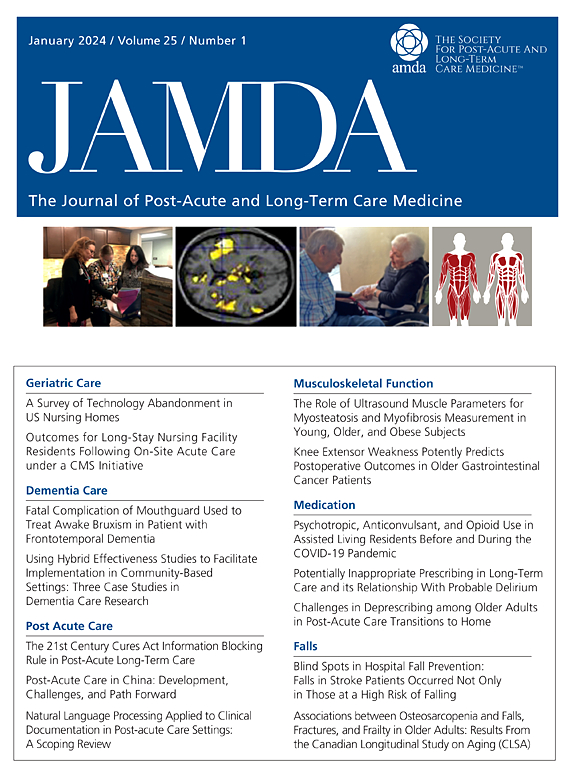疗养院住客认为家庭参与整体照护计划重要性与康复治疗管理之关系。
IF 3.8
2区 医学
Q2 GERIATRICS & GERONTOLOGY
Journal of the American Medical Directors Association
Pub Date : 2025-06-12
DOI:10.1016/j.jamda.2025.105704
引用次数: 0
摘要
目的:本研究探讨疗养院居民对家庭参与整体照护计划重要性的认知与物理及职业治疗的实施之间的关系。设计:横断面研究。环境和参与者:该研究的重点是2019年从急症护理机构转院的所有50岁及以上新入院的养老院居民。方法:我们分析了美国养老院2112330名50岁以上居民的最小数据集3.0的数据。我们根据居民对家庭参与护理计划的重要性的感知来评估家庭参与护理计划,范围从“根本不重要”到“非常重要”。排除在临终关怀、昏迷或预期寿命少于6个月的居民。结果被定义为物理和职业治疗分钟的总和。采用调整后的线性回归模型。结果:报告“非常重要”的家庭参与的居民年龄较大(平均年龄78岁),与其他组相比接受了更多的治疗时间。那些不太喜欢家庭参与的人更年轻,身体质量指数更高,自制能力更好,功能障碍更少。家庭参与较少的住院医生接受的治疗时间较少。在调整混杂因素后,认为家庭参与“根本不重要”的居民比认为家庭参与“非常重要”的居民接受的治疗时间少15分钟(95% CI, -18至-13)。结论和启示:该研究强调了家庭参与护理计划和养老院治疗管理增加之间的联系。报告更倾向于家庭参与的居民接受了更多的治疗时间,这种模式在各种人口和健康状况中是一致的。这一发现强调了家庭参与治疗的重要性,并强调了将家庭参与策略纳入养老院护理计划的必要性,以确保公平和有效的护理。本文章由计算机程序翻译,如有差异,请以英文原文为准。
Association Between Residents’ Perceived Importance of Family Involvement in Overall Care Planning and Rehabilitative Therapy Administration in Nursing Homes
Objectives
This study examines the association between nursing home residents' perceived importance of family involvement in overall care planning and the administration of physical and occupational therapy.
Design
Cross-sectional study.
Setting and Participants
The study focused on all newly admitted nursing home residents aged 50 years and older who transferred from acute-care facilities in 2019.
Methods
We analyzed data from the Minimum Data Set 3.0 for 2,112,330 residents aged 50+ years in US nursing homes. We assessed family involvement in care planning based on the resident's perceived importance of family involvement in care planning, ranging from “Not important at all” to “very important.” Exclusions were residents in hospice, comatose, or life expectancy of less than 6 months. The outcome was defined as a sum of physical and occupational therapy minutes. Adjusted linear regression models were used.
Results
Residents who reported “very important” family involvement were older (mean age 78 years) and received more therapy minutes compared with other groups. Those with a lesser preference for family involvement were younger and had higher body mass index, better continence, and less functional impairment. Fewer therapy minutes were received by residents with less family involvement. Residents who considered family involvement "Not Important at All" received 15 fewer minutes of therapy (95% CI, −18 to −13) compared with those who deemed it "very important" after adjusting for confounders.
Conclusions and Implications
The study highlights a link between family involvement in care planning and increased therapy administration in nursing homes. Residents reporting higher preference for family engagement received more therapy minutes, with this pattern consistent across various demographic and health conditions. This finding underscores the importance of family involvement in receipt of therapy and highlights the need for incorporating family engagement strategies in nursing home care planning to ensure equitable and effective care.
求助全文
通过发布文献求助,成功后即可免费获取论文全文。
去求助
来源期刊
CiteScore
11.10
自引率
6.60%
发文量
472
审稿时长
44 days
期刊介绍:
JAMDA, the official journal of AMDA - The Society for Post-Acute and Long-Term Care Medicine, is a leading peer-reviewed publication that offers practical information and research geared towards healthcare professionals in the post-acute and long-term care fields. It is also a valuable resource for policy-makers, organizational leaders, educators, and advocates.
The journal provides essential information for various healthcare professionals such as medical directors, attending physicians, nurses, consultant pharmacists, geriatric psychiatrists, nurse practitioners, physician assistants, physical and occupational therapists, social workers, and others involved in providing, overseeing, and promoting quality

 求助内容:
求助内容: 应助结果提醒方式:
应助结果提醒方式:


